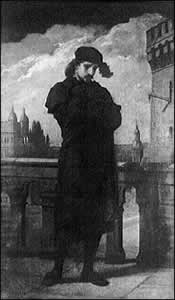![]()
Mal du siècle
| For a while Shakespeare reinvented himself almost every day. He had to: he was an actor. - Gary Taylor, Reinventing Shakespeare,Oxford, 1989. p.3 |
|
When viewed within the context of the refined aesthetic sensibilities of the late seventeenth century and the early eighteenth century, Shakespeare's work drifted into the background of the popular theater scene. However, with the Romantic revolution at the turn of the nineteenth century, those works jumped to the foreground where they have remained ever since. During that period, critical approaches to Shakespeare were expounded by such theorists as August Wilhelm von Schlegel, Samuel Taylor Coleridge and William Hazlitt -- approaches which have dominated our thinking about Shakespeare's work ever since. In particular, a resurgence of interest in psychology led to interpretations of Hamlet which forcefully argued the preeminence of the play. These theories have dominated our thinking about the play to this very day. With the Romantics, the plays that came into style tended to be large historical dramas which featured an enormous diversity of characters, locations, and moods. The shift in taste from the focused parlor dramas of the 18th Century to the rough and expansive plays of such writers as Victor Hugo and Johann Christoph Friedrich von Schiller, created an aesthetic which would support the return of Shakespeare to the height of literary and dramatic fashion, and Hamlet enjoyed a greater popularity during this period than any other work from the past. |
Oil painting by William M. Hunt. |
It also happened that the shift in taste that came about accompanied a resurgence of fascination with melancholy. For the Romantics, mal du siècle was the equivalent of "The Elizabethan Malady."
| [Fr.] distress at the condition of the world, pessimistic depression,
weariness of life. Used by Sainte-Beuve in 1833 of the early Romantic
poets. Also in the form mal de siècle. Cf. TAEDIUM VITAE;
WELTSCHMERZ. - Dictionary of Foreign Words
and Phrases. A.J.Bliss, Routeledge and Kegan Paul, London, 1972.
p.237
[Fr.] Weariness of life, Disillusionment at the state of the world. (mal doo see-EK-luh) - Concise Dictionary of Foreign Expressions. B.A. Phythian. Hodder and Stoughton, London. 1982. p. 84 |
